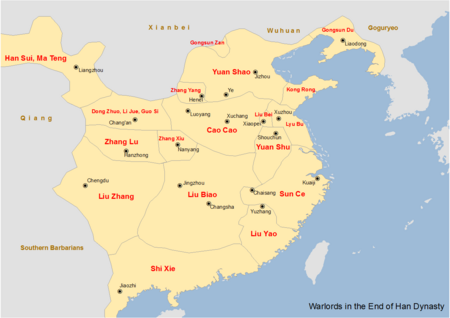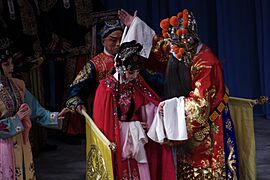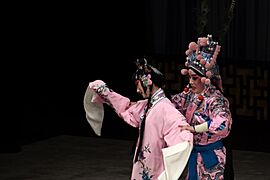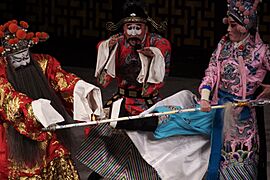Dong Zhuo facts for kids
Quick facts for kids
Dong Zhuo
|
|
|---|---|
| 董卓 | |
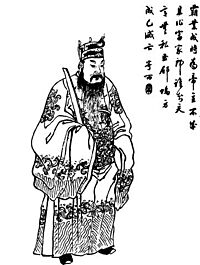
A Qing dynasty illustration of Dong Zhuo
|
|
| Grand Preceptor (太師) | |
| In office 189 – 22 May 192 |
|
| Monarch | Emperor Xian of Han |
| Chancellor of State (相國) | |
| In office 189 |
|
| Monarch | Emperor Xian of Han |
| General of the Vanguard (前將軍) | |
| In office 188–189 |
|
| Monarch | Emperor Ling of Han / Emperor Shao of Han |
| Personal details | |
| Born | 140s Min County, Gansu |
| Died | 22 May 192 Xi'an, Shaanxi |
| Children |
|
| Parents |
|
| Relatives |
|
| Occupation | Military general, politician, warlord |
| Courtesy name | Zhongying (仲穎) |
| Peerage | Marquis of Mei (郿侯) |
| Military service | |
| Allegiance | Han Empire Dong Zhuo's regime |
| Unit | Dong Zhuo's forces Han Imperial Forces |
| Battles/wars | Liang Province Rebellion Massacre of the Eunuchs Campaign against Dong Zhuo |
| Dong Zhuo | |||||||||||||||||||||||||||||
|---|---|---|---|---|---|---|---|---|---|---|---|---|---|---|---|---|---|---|---|---|---|---|---|---|---|---|---|---|---|
| Chinese | 董卓 | ||||||||||||||||||||||||||||
|
|||||||||||||||||||||||||||||
Dong Zhuo (born around the 140s – died May 22, 192), also known by his courtesy name Zhongying, was a powerful military general and politician in ancient China. He lived during the late Eastern Han dynasty. At the end of the Han dynasty, Dong Zhuo became a very strong general and an important minister in the government.
He came from a place called Liang Province. In 189, he took control of the capital city, Luoyang. This happened when the city was in chaos after the death of Emperor Ling of Han and a big fight among court officials. Dong Zhuo then removed the young emperor, Liu Bian, and put another young emperor, Emperor Xian of Han, in his place. This new emperor was a "puppet," meaning Dong Zhuo controlled him and ruled China himself.
Dong Zhuo's rule was short and known for being very harsh and unfair. The next year, many regional leaders and warlords formed an army to fight against him. Dong Zhuo couldn't stop them, so he looted and burned Luoyang. He then moved the capital further west to Chang'an (which is now Xi'an). Not long after, in May 192, he was killed by his own trusted officer, Lü Bu. This killing was planned by a minister named Wang Yun.
Contents
Early Life and Military Career
Dong Zhuo was born in Lintao, in the Longxi area, around the 140s. People said he was a brave young man who was physically strong. He was very good at archery while riding a horse. He traveled a lot in the regions where the Qiang and Xiongnu people lived and made many friends there.
Around 165, Dong Zhuo joined the Yulin corps, a part of the Imperial Guard in the capital. He served in a campaign to stop an uprising by the Qiang people. Over time, he held many important government jobs, like being a county magistrate and an inspector in different regions.
In the 170s, he worked as a minor official, overseeing captured thieves. Because of many raids by non-Han groups, he was promoted to lead troops against these attacks. He was very successful. Later, he was recommended to the "Three Excellencies," who were the highest officials in the government, and he got a job working for one of them.
When the Yellow Turban Rebellion started in 184, Dong Zhuo was sent to fight against the peasant rebels. At first, he didn't do well, but with help from another general, Huangfu Song, they finally won against the rebels.
During the Liang Province Rebellion, some local leaders and non-Han groups rebelled. Dong Zhuo was sent to stop them. While fighting this rebellion, he had different ideas from General Huangfu Song on how to fight. Even though Huangfu Song won, Dong Zhuo became angry and afraid of him.
In 185, Dong Zhuo was given the title "General Who Smashes the Caitiffs," and in 188, "General of the Vanguard." He was offered the job of governor of Bing Province, but he didn't want to leave his soldiers, so he refused. During these troubled times, the power of the Han dynasty was getting weaker. Dong Zhuo stayed in Liang Province and built up his own strong army.
Rise to Power in Luoyang
After Emperor Ling of Han died in May 189, a powerful general named He Jin asked Dong Zhuo to bring his troops to Luoyang. He Jin wanted Dong Zhuo's help to get rid of a powerful group of court officials called the eunuchs. But before Dong Zhuo arrived, the eunuchs killed He Jin in September of that year. The capital city became very chaotic. The eunuchs even took the young emperor, Liu Bian, hostage and ran away from Luoyang. Dong Zhuo's army found the eunuchs and brought the emperor back to the palace.
After He Jin's death, his step-brother, He Miao, was killed by some of He Jin's followers. This happened because He Miao seemed to support the eunuchs who had killed He Jin.
When Dong Zhuo arrived in Luoyang, he realized his 3,000 soldiers were not enough compared to the many troops in the capital. So, Dong Zhuo cleverly made some of his soldiers march out of the city at night and then march back in at dawn. This made it look like he was getting many more troops. He then took control of He Jin's leaderless army and convinced the famous warrior Lü Bu to join him. Dong Zhuo then made himself a very important government official.
In 189, Dong Zhuo removed Emperor Shao from power and put Liu Xie (who became Emperor Xian of Han) in his place. Dong Zhuo declared himself the chancellor, which meant he was in charge of the imperial court in Luoyang. However, Dong Zhuo was very harsh and often cruel to the court and officials. This made Yuan Shao and other regional leaders form an army to oppose Dong Zhuo's power.
Fighting Against Dong Zhuo
Dong Zhuo Moves to Chang'an
In the same year, many regional officials and warlords from across the country formed a large army. They launched a military campaign against Dong Zhuo. In response, Dong Zhuo sent some of his troops to fight the first group of the coalition army, led by Sun Jian. He also ordered his son-in-law, Niu Fu, to fill the fortress of Mei with enough food for 30 years. After his generals were defeated by Sun Jian, Dong Zhuo even tried to make a deal with Sun Jian. He offered to marry his daughter to Sun Jian's son and split the empire between their families. Sun Jian refused and prepared to attack Luoyang.
Dong Zhuo then made everyone in Luoyang move to Chang'an in the west. Before leaving, Dong Zhuo ordered his soldiers to dig up the tombs of past Han emperors to steal treasures. They also took valuables from rich people in Luoyang and burned down the palaces and anything else that might be useful to the coalition army.
Dong Zhuo then gathered his forces in the city and personally led them to surprise the approaching army. But Dong Zhuo's surprise attack failed, and Sun Jian's forces pushed him back. Dong Zhuo ordered Lü Bu to lead cavalry back to the city to slow down Sun Jian, while he himself fled. Sun Jian broke through one of the eastern gates, defeated Lü Bu, and took control of the city.
The Coalition Breaks Apart
Even though Sun Jian took Luoyang, the city was so badly damaged that he decided to leave instead of trying to hold it.
Dong Zhuo then sent his generals Li Jue, Guo Si, and Zhang Ji to fight the eastern warlords. By this time, the coalition army had already started to fall apart. The leaders were arguing among themselves. The only ones still actively fighting Dong Zhuo were a senior officer named Zhu Jun and his old friend, Tao Qian. Tao Qian, even though he had a general agreement with Dong Zhuo, sent 3,000 skilled soldiers to help Zhu Jun fight Dong Zhuo's forces. But Zhu Jun was defeated. Li Jue and his friends then raided the areas around Chenliu and Yingchuan and took many people as slaves.
Dong Zhuo's Harsh Rule
Two months after moving the capital, Dong Zhuo brought back an old title called "Grand Master." He made his younger brother, Dong Min, a high-ranking general and gave important jobs to several of his relatives.
Because Yuan Shao led the coalition against him, Dong Zhuo had all of Yuan Shao's family in Luoyang killed. In just two years, thousands of government workers were wrongly accused and executed. Many ordinary people were kidnapped or killed. To get materials to build his new fortress, he melted down old bells and bronze statues, including nine very famous large metal statues. He turned them into coins. However, his new coins didn't all weigh the same, which made all copper money lose its value.
Downfall and Death
Dong Zhuo kept Lü Bu as his personal bodyguard and even swore an oath to be like father and son. However, after an argument, Dong Zhuo threw a small axe at Lü Bu, who managed to dodge it.
In 192, with encouragement from a minister named Wang Yun, Lü Bu decided to kill Dong Zhuo. On the morning of May 22, 192, Lü Bu met Dong Zhuo at the palace gate. He had about a dozen trusted men with him, led by Li Su, who pretended to be guarding the gate with Wang Yun. Li Su stepped forward and tried to stab Dong Zhuo with a spear, but Dong Zhuo's armor saved him. Dong Zhuo cried out for Lü Bu to save him, but Lü Bu simply said, "This is an imperial order," and then delivered a fatal blow to Dong Zhuo.
All of Dong Zhuo's family members, including his 90-year-old mother, were put to death.
Legacy and Aftermath
After Dong Zhuo died, some of his loyal followers, like Li Jue, Guo Si, Zhang Ji, and Fan Chou, ran away. They thought they would be punished for being loyal to him. Wang Yun, who was now in charge of the government, heard their request for forgiveness. But he said, "Everyone else can be forgiven, but not them." So, the four planned to give up their positions and hide.
However, an advisor named Jia Xu suggested they should attack Chang'an instead. He said that Dong Zhuo's army was still strong. So, the four gathered several thousand followers and attacked Chang'an. Wang Yun sent his generals to fight them, but one was killed, and another joined the rebels. This made the rebel army grow to 100,000 soldiers, and they surrounded the capital. Lü Bu tried to break the siege but was defeated. Chang'an then fell into the hands of Dong Zhuo's followers. Emperor Xian was taken hostage again, and Dong Zhuo's former generals took control of the court.
Family Members
- Father: Dong Junya (died 181)
- Mother: Lady Dong (103–192), also called Lady of Chiyang, she was executed.
- Younger brother: Dong Min (died 192) – He was a high-ranking general. After Lü Bu killed Dong Zhuo, Dong Min was also executed.
- Nephew: Dong Huang (died 192) – He was the son of Dong Zhuo's elder brother. He was also executed.
- Daughter: She was married to Niu Fu.
- Foster Son: Lü Bu
 In Spanish: Dong Zhuo para niños
In Spanish: Dong Zhuo para niños
See also
- Lists of people of the Three Kingdoms
 | Delilah Pierce |
 | Gordon Parks |
 | Augusta Savage |
 | Charles Ethan Porter |


